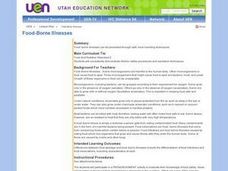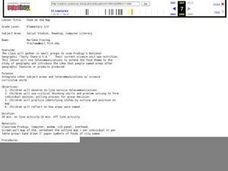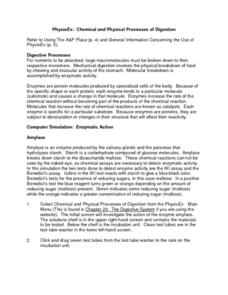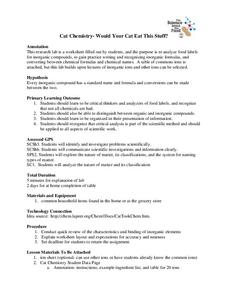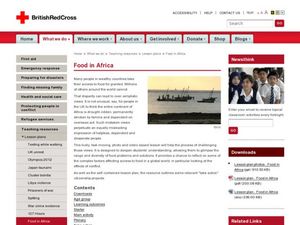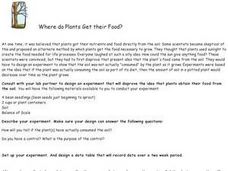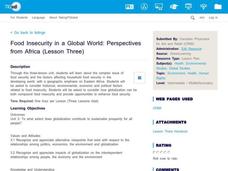Curated OER
Food-Borne Illnesses
Use this instructional activity to have your charges consider the differences between food spoilage and food-borne illnesses including the differentiation of food infections and food intoxication, including characteristics of each. Some...
Curated OER
Food on the Map
Students work together to examine the tastiest towns in the United States. After discovering the names of the equipment, they identify the seven continents. They take a survey and locate the cities and states of the foods mentioned.
Curated OER
Coffee & Chocolate: Knowing Healthy Foods
An article relaying vital information about health and nutrition are the backbone of this lesson on eating the right foods. A series of activities are used to help upper graders understand the science supporting our understanding of what...
Curated OER
Kaffee - und Teegesellschaften: German Foods
Introduce your Language young scholars to the culture and 19th century German custom of serving coffee and cake at small parties. They read old cookbooks, sort recipes, prepare foods, compare old German recipes to recipes from home and...
Curated OER
How Safe Is Your Cafeteria Food?
High schoolers explore how the school has done during recent food inspections. They write an article that explores the situation. Students create a chart of violations and corrections.
Curated OER
PhysioEx: Chemical and Physical Processes of Digestion
In this anatomy worksheet, pupils complete 22 review questions in the format of short answer, table completion, and fill in the blank after finishing an online virtual experiment about the chemical and physical processes of digestion.
California Academy of Science
Food for Thought: Defining a Problem to Find a Solution
Scholars approach a problem trying to plan a meal for a class party. They learn about the restrictions and must decide what information they need to plan the meal. The first lesson in a 13-part unit on Our Hungry Planet encourages...
Curated OER
Owls: Top of a Food Chain
Although written for middle schoolers, there is no reason that a 3rd, 4th, or 5th grader could not also learn about food chains through the dissection of owl pellets. After you introduce the topic, learners complete an owl research...
Curated OER
Food Travels and Preservation
Fourth graders study food processing and distribution. In this food processing lesson, 4th graders investigate various methods of food preservation. Students study methods of food distribution.
Consortium for Ocean Science Exploration and Engagement (COSEE)
Arctic Smorgasbord
Though the walrus spends roughly one third of its time on land, it eats organisms that live on the bottom of the ocean. The first in a series of five, the lesson uses a variety of plant and animal cards to have scholars build an arctic...
Baylor College
Bio Build-up
Trace pollutants through the environment in the seventh lesson of this series on the science of food. Looking at a picture of the plants and animals in an aquatic ecosystem, learners use dot stickers to represent harmful chemicals as...
Teach Engineering
Cellular Respiration and Bioremediation
You can breathe easily now that you've found a winning resource. Young biologists learn about the process of cellular respiration, primarily through teacher-led discussion and instruction. They also consider the concept of...
University of Georgia
Would Your Cat Eat This Stuff?
Processed foods use inorganic compounds for flavoring and preservation. This take-home laboratory challenges scholars to find 20 different compounds identified on the labels of foods to list on their data collection sheet. The activity...
Curated OER
2nd Grade - Act. 17: Source Relay
Help your 2nd graders understand the difference between natural and man-made materials. They will sort breakfast food items into sources: store, factory, natural world, and farm. They will work together to classify, form conclusions, and...
Curated OER
What Does Earth Day Mean? - Biology Teaching Thesis
Young scholars possible sources of water pollution, and explain the effects that water pollution can have on the food on the food chain. They Name human and other animal (i.e. fish) illnesses that can be contracted from drinking polluted...
Curated OER
Food Myths Critical Thinking and Reading
Students read a series of statements made by students about the hazards and benefits of various foods. They distinguish the "facts: from "opinions" in the dialogue, summarize the facts in a short paragraph, and write an essay...
Curated OER
Food in Africa
Students examine the shortage of food in Africa. In this geography skills lesson plan, students consider how conflict and extreme situations may result in food shortages for some nations. Students analyze the provided photographs and...
Curated OER
Food Preservation
Students examine the different food canning methods and how to be safe canning. For this canning lesson students examine the hazards of improperly canning.
Curated OER
Where Does Food Come From?
Distinguish between food and non-food items. Recognize that food is obtained from both plant and animal sources. Identify sources for some common animal foods then construct a simple food path from the farm to the consumer.
Chicago Botanic Garden
Food for Thought: Climate Change and Trophic Cascades
Learners examines the arctic food web with a short video about polar bears and an article about bears and warming temperatures. They design an arctic food web and discuss the trophic cascade that could come from climate change.
Curated OER
Where Do Plants Get Their Food?
Plants need food to survive, just like any other living organism. Young biologists analyze an experiment performed in 1610 by Jan van Helmont to determine if plant nutrition is obtained through the soil. First, lab groups work together...
Curated OER
Industrial Agriculture
Students write about the benefits that industrial agriculture has had on growing crops. In this industrial agriculture lesson plan, students research how technology has impacted the processing speed of growing food.
Curated OER
Food Insecurity in a Global World: Perspectives from Africa (Lesson One)
Students investigate food scarcity. In this global issues instructional activity, students examine food scarcity issues that have impacted the people of Eastern Africa. Students use the information they gather to determine methods of...
Curated OER
Food Insecurity in a Global World: Perspectives from Africa
Students investigate food shortages. In this global issues instructional activity, students examine how food scarcity issues have impacted the people of Eastern Africa. Students use the information they gather to consider how historical,...
Other popular searches
- Food Processing Nutrients
- Clip Art Food Processing
- Microbes in Food Processing
- Food Processing Fda
- Food Processing Lesson Plan


